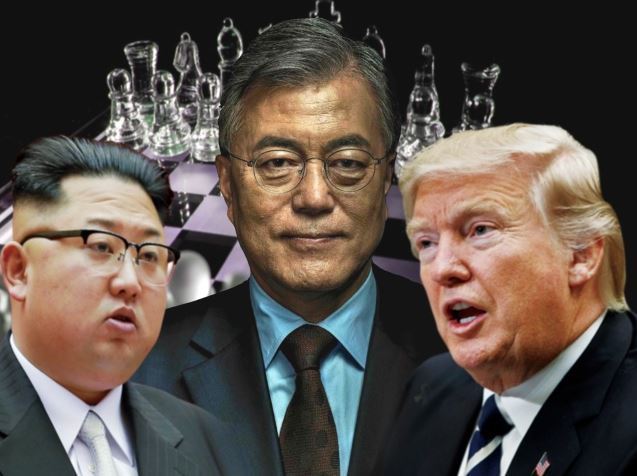South Korean President Moon Jae-in’s raising of the possibility of three-way talks among Seoul, Pyongyang and Washington shows his willingness to use the upcoming summits to push for the end of the Korean War, signing of the peace treaty and denuclearization all together, experts say.
Moon said the upcoming North Korea-US summit, expected to happen in May, could lead to a trilateral summit of the South, North and the US during a meeting of Seoul’s inter-Korean summit preparation committee Wednesday, according to pool reports.
Moon said the upcoming North Korea-US summit, expected to happen in May, could lead to a trilateral summit of the South, North and the US during a meeting of Seoul’s inter-Korean summit preparation committee Wednesday, according to pool reports.

Moon also highlighted the need to have any agreement with the North ratified by the parliament to make sure it is honored regardless of any possible change in leadership in South Korea.
“It is a reflection of Moon’s willingness to pursue the end of the Korean War through the upcoming summits, which is in line with the peace declaration signed on Oct. 4, 2007,” said Shin Beom-chul, a professor at the National Korea Diplomatic Academy.
“But to do so, there needs to be North Korea’s concrete action for denuclearization without any conditions attached because the declaration of the end of the Korean War could be used as a basis for North Korea’s call for the withdrawal of the US Forces from South Korea.”
Moon is to hold an inter-Korean summit with North Korean leader Kim Jong-un on the South’s side of the truce village of Panmunjeom in late April, which is expected to set the stage for a summit between Kim and US President Donald Trump in May.
Moon’s road map for denuclearization of the Korean Peninsula appears to be in line with the peace declaration signed on Oct.4, 2007 as a result of the second inter-Korean summit between liberal President Roh Moo-hyun and North Korean leader Kim Jong-il in Pyongyang. Moon participated in the negotiation with North Korea as chief of staff to Roh.
In the declaration, the two leaders called for a nuclear-free peninsula and a permanent peace pact between the two Koreas through dialogue and negotiation. The two Koreas remain technically at war, since the 1950-1953 Korean War ended in a truce, not a peace treaty.
In one of the eight clauses under the agreement, the two Koreas agreed to “cooperate to push for a declaration of the end of the Korean War through a meeting on the Korean Peninsula by leaders of three or four nations directly related to (matters of the peninsula).”
What the three or four nations refer to are not specifically mentioned. But the three nations are thought to mean South Korea, North Korea and the US, and the four nations include China.
His remarks are also meant to call on the US and North Korea to accelerate their efforts to hold an upcoming summit between Trump and Kim, another expert said.
“As the US and North Korea appear to be lukewarm about their upcoming summit, Moon probably wanted to urge them to be more active in seeking to resolve the nuclear crisis,” said Ko Myung-hyun, a research fellow at the Asan Institute for Policy Studies.
“But South Korea should be careful not to get ahead of itself,” he said, citing a possible difference between South Korea and the US on what should come first -- North Korea’s denuclearization or the peace treaty.
Since North Korean leader Kim offered to participate in the PyeongChang Winter Olympics and improve inter-Korean ties, President Moon has strived to use the momentum to broker talks between the US and North Korea, which he sees as key to resolving the nuclear crisis.
Moon’s special envoys to North Korea met with Kim and they delivered Kim’s invitation to Trump to hold a summit, which Trump accepted. It was a surprising breakthrough following a year of hostilities and insults between the leaders.
North Korea has yet to make an official comment on the proposed North Korea-US summit. It denounced the US as the world’s most brutal and sly imperialist in its state-run newspaper Thursday.
The White House on Wednesday dodged a direct response to Moon’s proposal of a trilateral summit, Yonhap News Agency reported. The spokesperson for the National Security Council was quoted as saying the two countries “are committed to maintaining close coordination about our unified response to North Korea.”
Meanwhile, China and Japan may be on edge amid concerns that the countries are being sidelined in the process of denuclearization of the peninsula.
“China would want to take part in the process of building the peace regime on the Korean Peninsula, but specifically calling for a three-way summit excluding China could displease China,” Shin noted, saying close coordination is needed.
Japan’s Chief Cabinet Secretary Yoshihide Suga did not deny speculations during a press briefing Thursday that it offered to hold a summit with North Korea over its nationals detained in the communist state and the North’s nuclear and missile programs.
(laeticia.ock@heraldcorp.com)
-
Articles by Ock Hyun-ju








![[Graphic News] More Koreans say they plan long-distance trips this year](http://res.heraldm.com/phpwas/restmb_idxmake.php?idx=644&simg=/content/image/2024/04/17/20240417050828_0.gif&u=)
![[KH Explains] Hyundai's full hybrid edge to pay off amid slow transition to pure EVs](http://res.heraldm.com/phpwas/restmb_idxmake.php?idx=644&simg=/content/image/2024/04/18/20240418050645_0.jpg&u=20240419100350)






![[From the Scene] Monks, Buddhists hail return of remains of Buddhas](http://res.heraldm.com/phpwas/restmb_idxmake.php?idx=652&simg=/content/image/2024/04/19/20240419050617_0.jpg&u=20240419175937)

![[KH Explains] Hyundai's full hybrid edge to pay off amid slow transition to pure EVs](http://res.heraldm.com/phpwas/restmb_idxmake.php?idx=652&simg=/content/image/2024/04/18/20240418050645_0.jpg&u=20240419100350)

![[Today’s K-pop] Illit drops debut single remix](http://res.heraldm.com/phpwas/restmb_idxmake.php?idx=642&simg=/content/image/2024/04/19/20240419050612_0.jpg&u=)